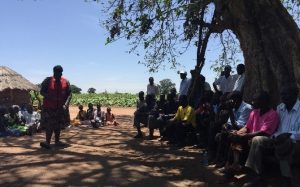Author(s): Carinus de Kock (Stellenbosch University), Harriet Aber (Makerere University), and Joy Waddell (Stellenbosch University)
 Map of the fieldtrip route from Kampala to Apeduru and Okoboi villages in north-eastern Uganda (via Google) |
As part of the fieldtrip, we visited the villages of Apeduru (in Amuria County, Asamuk Sub-County, Ajaki Parish) and Okoboi (in Kapelebyong County, Kapelebyong Sub-County, Okoboi Parish). Both of these villages are located in the Amuria District, Teso Sub-Region, 330km and 370km northeast from the country capital of Kampala, respectively. These rural village communities are extremely remote and lack basic infrastructure such as tarred roads, electricity, stormwater and water services. The town of Soroti, where we stayed for the duration of the fieldtrip, is 42km from Apeduru village, and the closest town for many essential services. Although there is fairly good cellphone coverage, many people living in these areas do not possess cellphones.
 Basic infrastructure in the trading centre in Amuria district |
 Electricity power lines and an MTN Mobile(phone) money kiosk (a common mode of money transfer in the district because of a lack of banks) |
Flooding, drought and diseases were identified as the most prevalent hazards in the two areas visited, as well as many surrounding areas. Contributing factors include rain that flows from the higher lying areas to the north such as Kabong, Moroto, Kotido and Nakapiripit districts in the Karamoja sub-region, and even Kenya, to low-lying, flat, swampy areas. Furthermore, it was indicated that soils in the area have a low water permeability and therefore maintains a high water table. The photos below show the main road to Apeduru and the high water level from heavy rainfall in Okoboi parish, which fell 2-3 days before the fieldtrip and caused severe waterlogging. The following impacts from the waterlogging were reported: 781 gardens and 7 houses were destroyed, and 24 households were relocated to higher ground. During heavy rainfall periods such as the one experienced prior to this fieldtrip, communities in these areas are often at risk of being cut off, with no access to main towns, neighbouring villages, nor incoming relief.
 Rising water alongside the main road to Apeduru village |
 Flooded main road to Apeduru village |
During group discussions with residents from Apeduru and Okoboi villages, residents indicated that the Uganda Red Cross has provided significant assistance during floods, such as flood-resistant housing. Furthermore, through environmental education and awareness, such as discussion on the most suitable crops and planting seasons, the Uganda Red Cross has built capacity and increased people’s preparedness to disaster risk. Unfortunately, due to standing water and damp conditions caused by flooding, diseases such as malaria, pneumonia, and foot-and-mouth are still prevalent in these areas. Waterlogging is also a major hazard that impacts negatively on local farming and agriculture. Residents from Okoboi village indicated that gender inequality in still prevalent, with men and women having specific roles and there being no gender cooperation; women, for example, are often excluded from critical decision-making processes.
 Group discussion in Apeduru village |
 Group discussion in Okoboi village |
During the group discussions, the communities highlighted a number of needs during this waterlogging event: tarpaulins for drying crops since their compounds are waterlogged; water purifiers for water treatment; mosquito nets and mosquito residual spraying; adequate water points since current water points are shared between people and their cattle; access to seed of fast-maturing crops; and gumboots and saucepans. The photo below shows water collection at a communal borehole, which is often shared with neighbouring villages and causes conflict during the dry season.
 Water collection point in Apeduru village |
During the group discussions, the two communities noted that prior to Red Cross intervention, they had their own indigenous knowledge for coping with water logging. The interventions they carried out included erecting bed stands in cases of flooding, and using iron sheets as flood covers. Since the intervention of FbF, they now have access to safer shelter and have learned how to dig trenches before flooding. These communities also attributed the reduction of malaria cases and waterborne diseases to the FbF intervention. The Red Cross also carried out other interventions in these areas, including environmental conservation, adopting and using energy-saving stoves, and provisions of soap, jerry cans, water tables, and garden hand-hoes.
We want to thank the Red Cross officials, and the local communities and their leaders for giving us their time and for their willingness to discuss some of the issues that they face during flood events.

